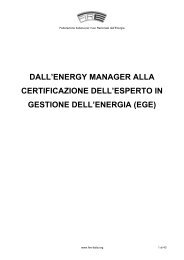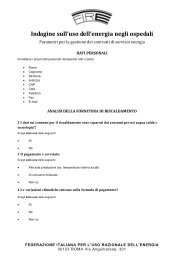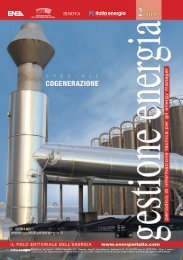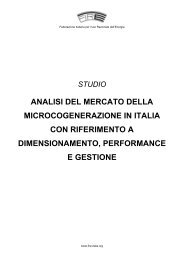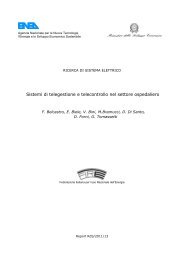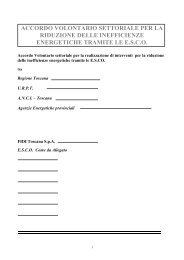part 1: overview of cogeneration and its status in asia - Fire
part 1: overview of cogeneration and its status in asia - Fire
part 1: overview of cogeneration and its status in asia - Fire
You also want an ePaper? Increase the reach of your titles
YUMPU automatically turns print PDFs into web optimized ePapers that Google loves.
Summary <strong>of</strong> country study – Bangladesh 135<br />
Tariff for bulk purchase <strong>of</strong> power at busbar<br />
The tariff structure would consist <strong>of</strong> two <strong>part</strong>s. In the solicited bids, the bidders shall <strong>of</strong>fer<br />
bulk power tariff based on the capacity payment <strong>and</strong> energy payment <strong>and</strong> also provide the<br />
equivalent levelized tariff. The capacity payment will be made <strong>in</strong> Bangladeshi currency<br />
(Taka), but denom<strong>in</strong>ated <strong>in</strong> both Dollars <strong>and</strong> local currency. This will cover debt service,<br />
return on equity, fixed operation <strong>and</strong> ma<strong>in</strong>tenance cost, <strong>in</strong>surance <strong>and</strong> other fixed cost. The<br />
energy payment will be denom<strong>in</strong>ated <strong>in</strong> local currency to the extent to which the variable<br />
costs are <strong>in</strong> local currency. This will cover the variable costs <strong>of</strong> operation <strong>and</strong> ma<strong>in</strong>tenance,<br />
<strong>in</strong>clud<strong>in</strong>g fuel.<br />
Interconnection <strong>of</strong> IPP to transmission system: The power will be purchased from the IPP at<br />
a specified voltage <strong>and</strong> frequency at the outgo<strong>in</strong>g term<strong>in</strong>al <strong>of</strong> the substation <strong>of</strong> the power<br />
plant. The cost <strong>of</strong> <strong>in</strong>terconnect<strong>in</strong>g facilities up to outgo<strong>in</strong>g term<strong>in</strong>als <strong>of</strong> the private power<br />
project will be borne by the private power producers.<br />
Fiscal <strong>in</strong>centives<br />
The private power companies shall be exempted from corporate <strong>in</strong>come tax for 15 years.<br />
Repatriation <strong>of</strong> equity along with dividends will be allowed freely. Income tax will be<br />
exempted for foreign companies. The foreign <strong>in</strong>vestors will be free to enter <strong>in</strong>to jo<strong>in</strong>t ventures<br />
but this is optional <strong>and</strong> not m<strong>and</strong>atory. The companies will be allowed to import plant <strong>and</strong><br />
equipment without payment <strong>of</strong> customs duties, VAT <strong>and</strong> any other surcharges. Private<br />
power companies will be exempted from the requirements <strong>of</strong> obta<strong>in</strong><strong>in</strong>g<br />
<strong>in</strong>surance/re<strong>in</strong>surance only from the national Insurance Company <strong>and</strong> exempted from duty<br />
payments. Power generation companies are eligible for all concessions that are available to<br />
<strong>in</strong>dustrial projects. Private <strong>part</strong>ies may raise local <strong>and</strong> foreign f<strong>in</strong>ance <strong>in</strong> accordance with<br />
regulations applicable to <strong>in</strong>dustrial projects as def<strong>in</strong>ed by the Board <strong>of</strong> Investment (BOI).<br />
Local eng<strong>in</strong>eer<strong>in</strong>g <strong>and</strong> manufactur<strong>in</strong>g companies shall be encouraged to provide<br />
<strong>in</strong>digenously manufactured equipment <strong>of</strong> <strong>in</strong>ternational st<strong>and</strong>ard to private power plants.<br />
Other facilities <strong>and</strong> <strong>in</strong>centives for foreign <strong>in</strong>vestors: Several other <strong>in</strong>centives extended by the<br />
government <strong>in</strong>clude tax exemption on royalties, technical assistance fees, <strong>and</strong> facilities for<br />
their repatriation; tax exemption on <strong>in</strong>terest on foreign loans; tax exemption on capital ga<strong>in</strong>s<br />
from transfer <strong>of</strong> shares by the <strong>in</strong>vest<strong>in</strong>g company; avoidance <strong>of</strong> double taxation <strong>in</strong> case <strong>of</strong><br />
foreign <strong>in</strong>vestors on the basis <strong>of</strong> bilateral agreements; exemption <strong>of</strong> <strong>in</strong>come tax for up to 3<br />
years for the expatriate personnel employed by the <strong>in</strong>dustry, etc.<br />
Start<strong>in</strong>g from 1997, the government is consider<strong>in</strong>g to <strong>in</strong>stall a capacity <strong>of</strong> 1,500 MW through<br />
IPPs. Four agreements have so far been made, two <strong>of</strong> which are be<strong>in</strong>g implemented while<br />
several other projects are <strong>in</strong> the pipel<strong>in</strong>e. An Independent Power Producer (IPP) is generally<br />
required to sign four contract agreements. These are the Power Purchase Agreement with<br />
BPDB; Implementation Agreement with the Government; Fuel Supply Agreement with the<br />
buyer <strong>and</strong> the supplier <strong>of</strong> fuel; L<strong>and</strong> Lease Agreement with the buyer.<br />
Many special features <strong>in</strong>cluded <strong>in</strong> the IPP contract are very much <strong>in</strong> favour <strong>of</strong> the IPP, <strong>and</strong><br />
are not extended to BPDB which is work<strong>in</strong>g presently with an <strong>in</strong>stalled generat<strong>in</strong>g capacity <strong>of</strong><br />
2,900 MW. The tariff charges <strong>in</strong> some cases are above the <strong>in</strong>ternational price.



